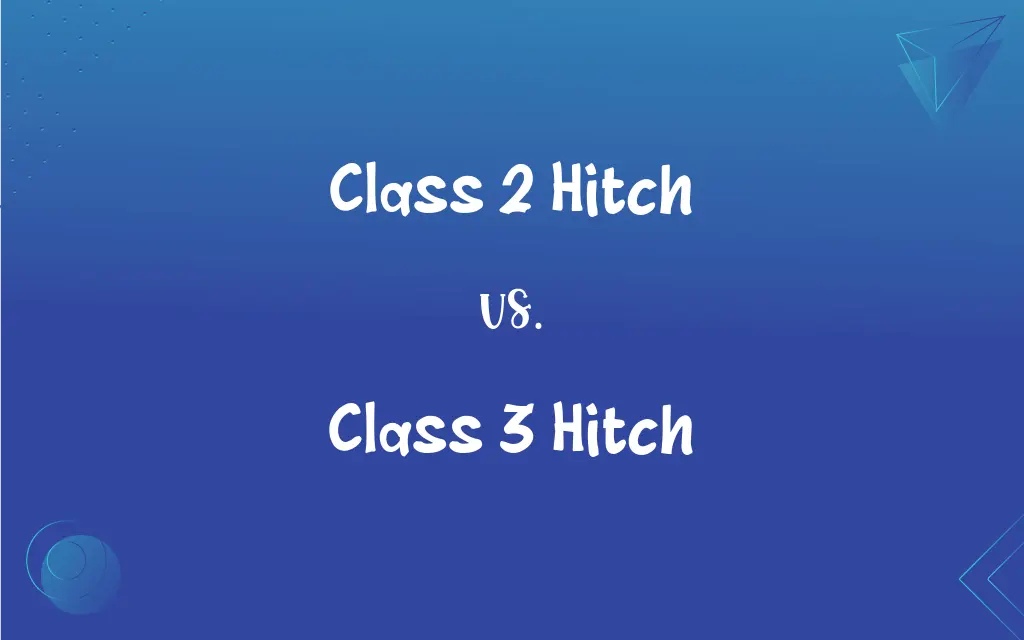Class 2 Hitch vs. Class 3 Hitch: What's the Difference?
Edited by Aimie Carlson || By Janet White || Published on March 5, 2024
A Class 2 hitch is designed for light-duty towing up to 3,500 lbs, while a Class 3 hitch is for medium-duty, handling up to 8,000 lbs.

Key Differences
A Class 2 hitch is typically used for light-duty towing and is suitable for smaller vehicles like sedans and crossovers. In contrast, a Class 3 hitch is more robust, designed for medium-duty towing, and is commonly found on larger vehicles like SUVs and trucks.
The Class 2 hitch usually has a 1.25-inch receiver, suitable for smaller accessories and light trailers. On the other hand, the Class 3 hitch often features a 2-inch receiver, accommodating a wider range of towing accessories and heavier loads.
When it comes to towing capacity, a Class 2 hitch generally supports up to 3,500 lbs of gross trailer weight. Conversely, a Class 3 hitch can handle much heavier loads, typically up to 8,000 lbs, making it more versatile for varied towing needs.
Installation of a Class 2 hitch is relatively simpler and often chosen for occasional, light towing tasks. In comparison, the Class 3 hitch, due to its higher towing capacity, may require a more complex installation process and additional vehicle modifications.
In terms of applications, Class 2 hitches are ideal for towing small trailers, bike racks, or light cargo carriers. Meanwhile, Class 3 hitches are better suited for towing larger trailers, boats, or campers, offering greater flexibility and strength.
ADVERTISEMENT
Comparison Chart
Receiver Size
1.25 inches
2 inches
Towing Capacity
Up to 3,500 lbs
Up to 8,000 lbs
Vehicle Suitability
Sedans, Crossovers
SUVs, Trucks
Usage
Light-duty Towing
Medium-duty Towing
Installation
Simpler
More Complex
ADVERTISEMENT
Class 2 Hitch and Class 3 Hitch Definitions
Class 2 Hitch
This hitch category has a 1.25-inch receiver for light towing accessories.
I attached a bike rack to my car's Class 2 hitch for our cycling trip.
Class 3 Hitch
Class 3 hitches are common on larger vehicles like SUVs and trucks.
My SUV's Class 3 hitch is great for pulling my large camping trailer.
Class 2 Hitch
Ideal for occasional towing needs with smaller trailers.
For my small gardening business, the Class 2 hitch is just right for hauling supplies.
Class 3 Hitch
Features a 2-inch receiver, suitable for a variety of towing tasks.
I used the Class 3 hitch's 2-inch receiver for my multi-use towing platform.
Class 2 Hitch
A Class 2 hitch is a light-duty towing hitch for small loads.
I used a Class 2 hitch to tow my jet ski to the lake.
Class 3 Hitch
A Class 3 hitch is a medium-duty hitch for heavier loads.
I relied on my truck's Class 3 hitch to tow my boat to the harbor.
Class 2 Hitch
Class 2 hitches are designed for vehicles like sedans and crossovers.
My crossover's Class 2 hitch is perfect for hauling my small trailer.
Class 3 Hitch
Ideal for regular towing of larger trailers or boats.
For frequent trips with my horse trailer, the Class 3 hitch is indispensable.
Class 2 Hitch
Class 2 hitches support up to 3,500 lbs of towing weight.
The Class 2 hitch on my car can easily tow my camping gear trailer.
Class 3 Hitch
These hitches can handle up to 8,000 lbs of towing capacity.
The Class 3 hitch on my vehicle easily manages the weight of my dual-axle trailer.
FAQs
What is a Class 3 hitch?
A medium-duty hitch for towing up to 8,000 lbs, usually featuring a 2-inch receiver.
Can I use a Class 2 hitch on any vehicle?
It's best for smaller vehicles like sedans and crossovers.
What can I tow with a Class 2 hitch?
Small trailers, bike racks, and light cargo carriers.
Is a Class 3 hitch suitable for trucks and SUVs?
Yes, it's designed for larger vehicles like trucks and SUVs.
What can I tow with a Class 3 hitch?
Larger trailers, boats, campers, and more substantial loads.
Can I upgrade from a Class 2 to a Class 3 hitch?
Depends on your vehicle’s specifications and towing needs.
Do I need additional accessories for a Class 2 hitch?
Only basic towing accessories for light-duty tasks.
What about the installation of a Class 3 hitch?
It may require more complex installation and vehicle modifications.
What is a Class 2 hitch?
A light-duty hitch for towing up to 3,500 lbs, typically with a 1.25-inch receiver.
Are Class 3 hitches more expensive than Class 2?
Typically, due to their larger size and higher capacity.
How do I maintain a Class 2 hitch?
Regular inspections and keeping it clean from rust and dirt.
Is installation of a Class 2 hitch easy?
Generally simpler and suitable for occasional towing.
What’s the safety consideration for a Class 2 hitch?
Ensure load is within capacity and properly secured.
What are safety tips for using a Class 3 hitch?
Check load capacity, securement, and also vehicle’s towing capability.
Is a Class 3 hitch better for rough terrain?
Generally, yes, as it's built for tougher towing conditions.
What accessories might I need for a Class 3 hitch?
Potentially more varied, including heavy-duty hitch pins and stabilizers.
Can a Class 3 hitch handle long-distance heavy towing?
Yes, it's designed for more robust and sustained use.
Can I use a Class 2 hitch in rough terrain?
It's not recommended due to its limited capacity.
Is a Class 2 hitch suitable for long-distance towing?
Best for shorter trips due to its lighter capacity.
What about maintaining a Class 3 hitch?
Similar care, with added attention to its heavier use wear and tear.
About Author
Written by
Janet WhiteJanet White has been an esteemed writer and blogger for Difference Wiki. Holding a Master's degree in Science and Medical Journalism from the prestigious Boston University, she has consistently demonstrated her expertise and passion for her field. When she's not immersed in her work, Janet relishes her time exercising, delving into a good book, and cherishing moments with friends and family.
Edited by
Aimie CarlsonAimie Carlson, holding a master's degree in English literature, is a fervent English language enthusiast. She lends her writing talents to Difference Wiki, a prominent website that specializes in comparisons, offering readers insightful analyses that both captivate and inform.
































































